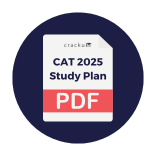The sum of a given infinite geometric progression is 80 and the sum of its first two terms is 35. Then the value of n for which the sum of its first n terms is closest to 100, is
Solution
Let 'a' be first term, 'r' be common ratio of an infinite GP :
$$\ \dfrac{\ a}{1-r}=80$$ ..... $$1^{st}$$ Equation .
sum of first two terms = a + ar = a(1 + r) = 35.... Equation 2.
Substituting equation 1 in $$2^{nd}$$ equation : 80(1 - r)(1 + r) = 35
(1 - r)(1 + r) = $$1-r^2$$ = $$\dfrac{\ 7}{16}$$
hence,$$r=\pm\ \dfrac{\ 3}{4}$$
The possible values for (a,r) = (20, 3/4) or (140, -3/4)
Sum of first 'n' terms of GP = a($$\dfrac{\ 1-r^n}{1-r}$$) = 100
If we check for (a,r) = (20, 3/4):
It gives us that : $$1-\left(\dfrac{\ 3^n}{4^n}\right)$$ = $$\dfrac{\ 5}{4}$$ . But 1 minus some positive value can never be $$\dfrac{\ 5}{4}$$ which is greater than 1. Hence, this possibility is ignored.
Now, the only possibility is (a,r) = (140, -3/4) :
It gives us that : $$1-\dfrac{\ \left(-1\right)^n3^n}{4^n}=\dfrac{\ 5}{4}$$
This implies , $$\dfrac{-1}{4}=\dfrac{\left(-1\right)^n3^n}{4^n}$$
Therefore, closest integral value of n is 5.
Create a FREE account and get:
- Download Maths Shortcuts PDF
- Get 300+ previous papers with solutions PDF
- 500+ Online Tests for Free

